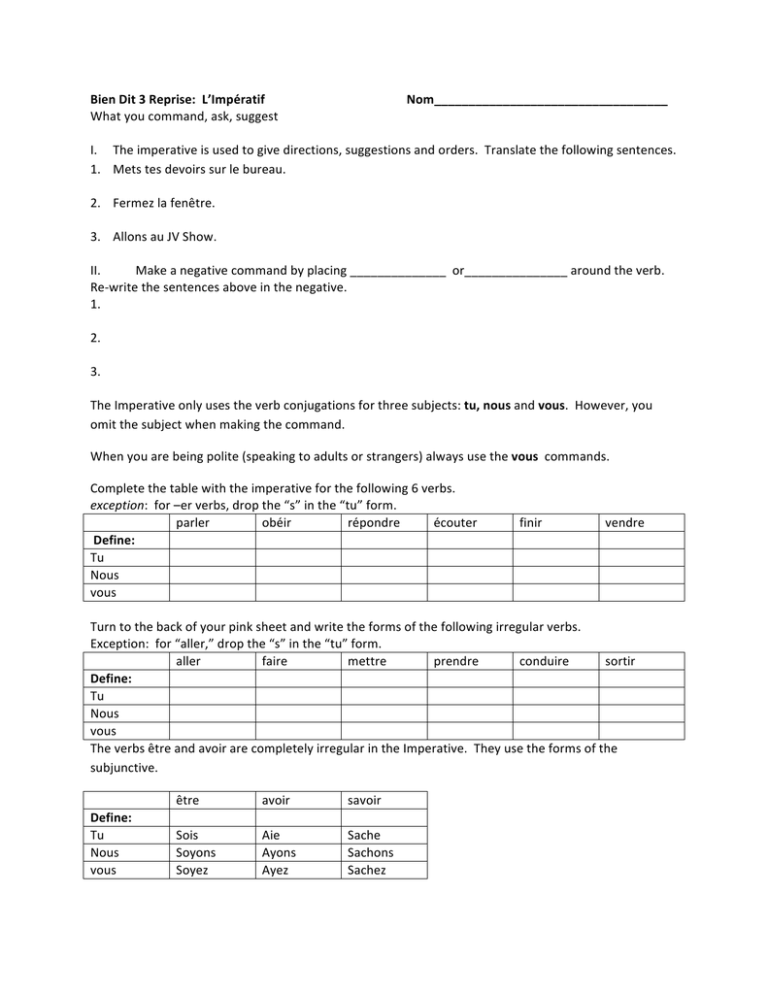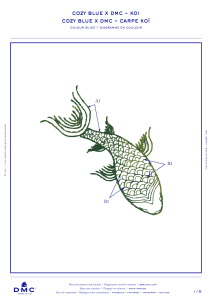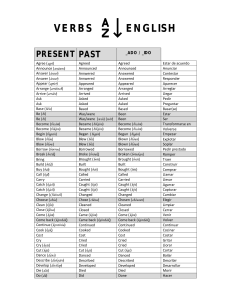Document 14323668
advertisement

Bien Dit 3 Reprise: L’Impératif Nom__________________________________ What you command, ask, suggest I. The imperative is used to give directions, suggestions and orders. Translate the following sentences. 1. Mets tes devoirs sur le bureau. 2. Fermez la fenêtre. 3. Allons au JV Show. II. Make a negative command by placing ______________ or_______________ around the verb. Re-­‐write the sentences above in the negative. 1. 2. 3. The Imperative only uses the verb conjugations for three subjects: tu, nous and vous. However, you omit the subject when making the command. When you are being polite (speaking to adults or strangers) always use the vous commands. Complete the table with the imperative for the following 6 verbs. exception: for –er verbs, drop the “s” in the “tu” form. parler obéir répondre écouter finir vendre Define: Tu Nous vous Turn to the back of your pink sheet and write the forms of the following irregular verbs. Exception: for “aller,” drop the “s” in the “tu” form. aller faire mettre prendre conduire sortir Define: Tu Nous vous The verbs être and avoir are completely irregular in the Imperative. They use the forms of the subjunctive. Define: Tu Nous vous être Sois Soyons Soyez avoir Aie Ayons Ayez savoir Sache Sachons Sachez FRIV L’IMPÉRATIF TRADUISEZ EN FRANÇAIS NOM________________________________________ 1. Take out your worksheet and do your homework. (tu) 2. Go left 20m , then enter the door on your right. (vous) 3. Let’s drive to the beach this weekend. (nous) 4. Don’t speak English; speak French! (vous) 5. Take out your homework. (vous) 6. Let’s take a cab. (nous) 7. Let’s go in limo! (nous) 8. Finish your homework before class. (tu) 9. Do not answer if you do not know the answer. (vous) 10. Let’s not obey the teacher on April Fool’s Day. (nous) 11. Don’t talk; listen. (vous) 12. Sell the car and buy a red convertible. (tu) 13. Don’t be late for French class. (vous). 14. Put your worksheet in your binder. (tu) 15. Do not take candy if you did not do your work. (vous) 16. Let’s listen to the “aller” song again. (nous) 17. Do not drive fast on Valley Road. (tu) 18. Be happy! (vous) 19. Be nice! (tu) 20. Be hungry and be crazy! (vous) (a quote from Steve Jobs) FRIV – L’Impératif avec les verbes réfléchis. (se_______________________) When making a command with reflexive verbs, you simply add a hypen, followed by “toi” “nous” or “vous.” Translate the following familiar expressions. Lève-­‐toi. Asseyez-­‐vous. Mettez-­‐vous en groupes de 3 ou 4 personnes. Le dîner est prêt ; mettons-­‐nous à table. Pratiquez – traduisez en français selon les modèles. 1. Brush your teeth. (tu) 2. Let’s get dressed in crazy costumes. (nous) 3. Get in bed ! (vous) 4. Wash your hands with soap. (vous) 5. Let’s hurry or we will miss the bus. (nous) 6. Have fun during your vacation! (tu) L’impératif avec les pronoms : 1. au négatif: (l’ordre « normal » ; no hyphen) Ne me les donne pas pour mon anniversaire. 2. à l’affirmatif : a. link pronouns with a hyphen b. me, te becomes moi, toi *(moi, toi becomes m’ , t’ before en) moi* le toi* la -­‐ lui -­‐ y -­‐ en les nous vous leur FORMAT : À L’AFFIRMATIF AU NÉGATIF ex : Brosse-­‐toi les cheveux dans la voiture. Mettez-­‐vous à côté de Caroline. Donne-­‐les-­‐moi pour mon anniversaire Donne-­‐m’en pour mon anniversaire. Ne te brosse pas les cheveux dans la voiture. Ne vous mettez pas à côté de Caroline. Ne me les donne pas pour mon anniversaire. Ne m’en donne pas pour mon anniversaire.


